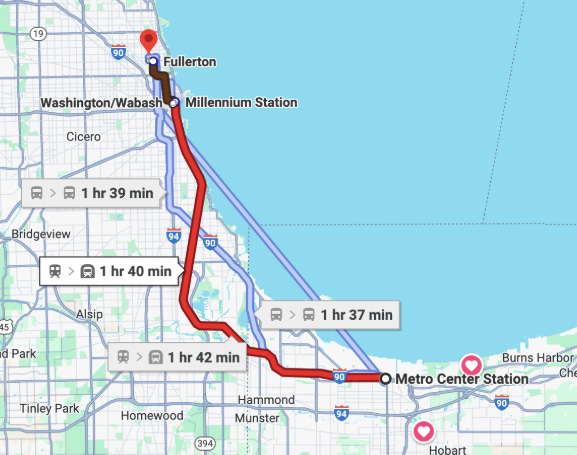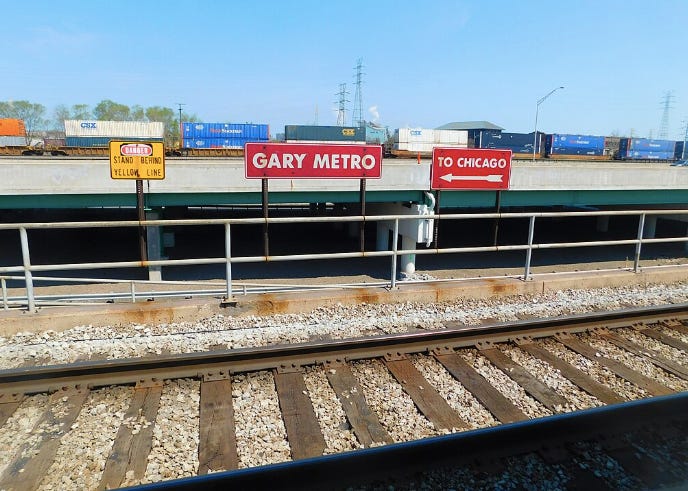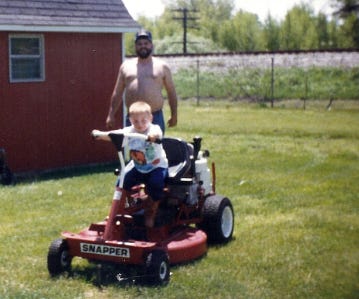Sammy on the South Shore
Finance is learned from the streets, not in the classroom
Note: This post was pulled from Robert’s 2005-2008 journal archive (written initially September 19, 2008) and reworked.
In the summer of 2008, I moved to Chicago, but quit my job working for a market maker at the Chicago Board of Options Exchange (CBOE) just before relocating. Luckily, my former employer, Mr. Hooks, was willing to take me back at his engineering firm in Gary, Indiana.
That forced me into a long daily reverse commute, which included a walk to the Red Line ride to the Loop, then another walk to the South Shore, where I would traverse back to The Region. I met a lot of people on the train that year, but Sammy taught me something new: finance is learned from the streets, not in the classroom.
Before there were smartphones to entertain, sitting on a quiet train for an hour next to a stranger felt weird to me unless I had headphones or a book. Internet for laptops? Not a chance.
I could only stare off into space for so long before nervously striking up conversations with my seat mate to pass the time. I wasn’t desperate for a job, but not using my college education was eating away at me, and the Great Recession wasn't paying any favors to those with degrees in finance. With that, I tried to network with anyone that looked important. Us blue-collar kids are taught implicitly to believe that anyone wearing dress clothes or a tie must be successful. Little did I know, in the acquisition of business cards, I was practicing elements from the book "How to Talk to Anyone,", read many years later.
Every day, Mr. Hooks dropped me off at the Gary Metro Center, which was on his way home from the office, a practice we did for the duration of my time in Chicago. On this particular evening, the train was late and people were not having it. One guy looked particularly annoyed. He was my height but arguably the most jacked AND ripped person I’d ever seen. I wanted to ask him about his fitness and diet plan, but instead, chickened out and just started small talk by asking him when the train would arrive… like he would know. Again, there was no technology at the time to tell us otherwise. He asked me about how to find work, and I told him the mill was the place to be. It was great work…if you could get it.
That often required an “in” such as a family member or friend. For whatever reason, we exchanged numbers and I told him we could continue to chat about it on the train. He introduced himself as Vic Young. (I used Sammy in the title of this post for alliteration.)
After sitting down, he immediately asked me what I did for employment. I replied that I worked at an engineering firm. By his facial expression, it was clear he had no idea what that meant. When I returned the question, he said, “I work out.” I probed deeper because I assumed he worked at a gym. Vic quickly went into his personal story. He said nonchalantly that he had just been released from jail and was living in some transitional housing in Chicago before moving back to stay with his mother in Gary. Vic said he was in prison since age 20 and had been “working out” for 11 years now. I finally circled back to my original motive and asked about his diet, which consisted of mostly oatmeal every day. I couldn’t believe it.
Vic went to Roosevelt High School, which was dedicated in 1931 and built exclusively for black students in order to maintain racial segregation in Gary after the Emerson School Strike. He never finished at ‘The Velt’ and dropped out to run a small drug operation where he most sold crack. That is until he was caught by the FBI. I made a note to him that those cases are built slowly but tended to have ironclad cases on the back end, resulting in severe sentences. He already knew that, though, because before landing in the state pen, he’d been caught by the Gary Police a few times. Vic said he often carried about $5,000 cash, but when he was turned in, law enforcement would only report that he had $1,000 on hand. He knew they kept the rest but believed that was business as usual. Intermittently while telling his story, Vic would comment multiple times on the attractiveness of the ladies sitting around us. My reviews were mixed, but I quickly realized it might have been a while since he actually saw a woman.
Vic told me he never joined a gang and ran a relatively small operation that consisted of foot soldiers and one financier. His paper came from a family member whom he refused to narc on after being caught by the Feds, like leading to a longer sentence. Because he was “small time,” Vic said he never had to worry about drive-by shootings. Apparently, for him, small time was regularly turning $ 20,000 into $ 80,000 with what he called little effort.
I asked how a community so impoverished could afford drugs. Vic told me “street money” was different from “regular money.” He said women in their late 20s had a lot of cash for drugs, especially the prostitutes on Broadway. He went through the various inputs and outputs of the business to the point I was convinced that he knew what a balance sheet and income statement were from my finance classes. I threw out some terms like price-to-earnings (P/E) ratio, debt-to-equity ratio, liquidity ratio, inventory turnover ratio, and operating margin. Vic never heard of such jargon but as he continued to talk, it became clear that he was using these terms in real time to make informed business decisions.
Given how complex our financial system had become, I told him drug dealing was probably “more pure” from an economics standpoint than many legitimate businesses. There are no direct government subsidies on the production side, sales are tax-free, income is tax-free, free markets and open competition reign, no regulatory compliance costs (although paying off cops could fall into that bucket), and no lobbying the government for regulatory capture.
Risk is inherent in all businesses, and Vic knew there were two big ones in his line of work that couldn’t be measured with a calculator much less a degree: prison and death. Given the high unemployment and lack of legitimate opportunities in the area, he understood that many aspiring foot soldiers would take on that risk for virtually any wage. Being street smart, Vic positioned himself in management between the people on the streets and those who financed the operations.
With my nerdiness, you could tell he was starting to drift from the conversation, and at some point, he just got up and said he was going to “throw some game” at a girl down the aisle. He ended up talking to her for about 10 minutes before I overheard her say, “I’m in a relationship,” to which he quickly returned to our seat unphased.
I jokingly told him that he should write a book about street finance as a way to teach young people entrepreneurship, and it could be leveraged into real, meaningful work. He had no interest but said, “Mane, you are pretty smart. You must read a lot.” I agreed, but said it was because I was also looking for a job online and often got distracted by various Wikipedia rabbit holes.
Living in Chicago, I became enamored by the city’s history leading me into all things Al Capone including the wars between the Chicago Outfit and Northside Gang. While traveling through the evolution of organized crime, I’d become astute as to how black drug dealers were exploited by other ethnic groups but still worked their way to the top across the country.
My education included learning about high-profile kingpins such as Bumpy Johnson, who brokered deals with the mafia in Harlem in the 1930s where years later Nicky Barnes would form The Council, and Frank Lucas, ultimately changed the neighborhood by cutting out the middlemen via direct shipments from Golden Triangle of Southeast Asia. Stanley “Tookie” Williams started the Crips in LA, but it was “Freeway” Ricky Ross who undercut the competition in price by buying in bulk leading to thousands of employees in over 40 cities. Lastly, bringing it back to Chicago, Jeff Fort founded the Black P. Stones, which later became El Rukn, and leveraged its religious affiliation to evade law enforcement surveillance.
Vic was shocked that a white boy knew so much about what he called black history. I was even more shocked that a guy who had never used the internet and spent the past decade in prison knew so much about people who weren't exactly found in our history books. For a moment, I began to ponder where he learned this information, but then Vic jumped into politics.
“Is Obama going to win?” he asked. “Yeah, he will,” I said. “Are you kidding me?” he responded with both a look of confusion and excitement.
“You should be much more concerned about local politics because that’s where things actually happen.” I said.
Back to my nerd ways, I spoke about my concerns regarding the City of Gary, specifically my confusion about where the millions in casino revenues went while knowing that local law enforcement was among the lowest-paid in the nation, despite being subjected to far more danger than most in the profession. It didn’t make sense to me that the mayor made more than the governor of the state (at that time). Either way, I told him that Gary was the victim of a perfect storm and, in time, the city would repair itself. He couldn't see the possibilities. Many still don’t.
As we rolled into Millennium Station, I emphasized the importance of finishing his GED at Malcolm X College. From there, I gave unsolicited advice to leverage every contact he could to try to get a job in the mill since I knew they were the best-paying on earth for someone without a college degree. However, I also tried to temper his expectations, given the past. Just a few years earlier, several mills went bankrupt, including LTV Steel and Bethleham Steel in Northwest Indiana. There was no telling what this recession might bring.
Their assets were bought for pennies on the dollar while workers’ pensions were slashed, some in half. Mr. Hooks never told me, but I know, based on conversations in the industry, he kept me on staff despite the mills running far behind on their payments to contractors that year. If there’s anything I learned from him, it’s that frugal entrepreneurs who live well below their means can weather any economic storm.
Not everyone receives fair treatment, though. That same month in September, the federal government bailed out AIG, and took over Fannie Mae and Freddie Mac, but allowed Washington Mutual and Lehman Brothers to file for bankruptcy. Having graduated less than a year earlier, this government intervention was an affront to everything I learned in college. Many banks were deemed too big to fail and deserved a bail out from the Troubled Asset Relief Program but even though the program “made money” for the government, it allowed for more industry consolidation, ironically, making the system more fragile and inviting moral hazard. The system now rewarded failure, as millions in bonuses were still paid out. I was proud to see some locally own banks like Centier, founded in 1896, stick to their principles. Steel mills as critical national security assets just aren’t as important but I guess loans to General Motors were the best consolation prize for the Rust Belt.
I was never destined to work in government or politics, but it was the defining moment that led me to grad school a few months later. Here, I could carve a different path and inject my working class blue-collar views into the conversation.
Vic and I parted ways in downtown Chicago, and I never saw him again. While writing this post, I pulled up his cell number but learned through a voicemail that it had long been reassigned to a gal named Kim.
After returning to my pad in Lincoln Park, I sat down to reflect on what had just happened and had a flashback to one of the many life lessons from my late dad.
He said, “Son, those As and Bs in high school will be Bs and Cs at best in college. You need to understand the importance of seat time.” To him, that meant real world experience and learning on the job. He echoed the last part many times over the years. I scoffed at his comments knowing that we both had the same teachers in high school, yet he was a D student on a good day. Ironically, he demanded excellence from me in the classroom. Dad couldn’t pass algebra or geometry, but he practiced the same math regularly with all the “projects” we had at home.
Whether it was plumbing, woodworking, roofing, building some widget or maintaining lawn mowers/cars, he solved complex problems effortlessly. He rarely gave me the answers to anything, and one of his most frequently used phrases was, “Son, figure it out.” Dad had practical and useful intelligence, but I’d been conned by higher education to believe that he wasn’t smart because he wasn’t “credentialed.” The reality is he had more brainpower upstairs than most PhDs I’ve met in life.
Like Dad, Vic was an autodidact. While the family taught them both basic skills, most of their advanced knowledge would come the old-fashioned way. Dad had an expression for this and used to say, “Son, you learn by doing.” The Egyptians built the pyramids without the math shortcuts of a slide rule or the Ti-89 I used in high school, but they figured it out through the tribulations of trial and error, the mother of all teachers. The Ancient Greeks were academics, but the Romans were practitioners. Whether one comes from the streets, steel country, or a farm, there is something to be said about respecting people in this country regularly deems as “uneducated.” I might have a fancy degree in money, but Vic “turned shit into sugar”, given the only options before him. The school of hard knocks is real, but in the end, we are better for it. Thanks for the lesson, Vic. Class is dismissed.







You mention Washington Mutual, they went bust in the recession. It was the largest bank failure in U.S. history. Depositors were protected by the FDIC but there was no bailout, stockholders lost 100% of their investment. The Feds ended up selling WA Mu's assets (branch banks, customer list, etc) to JP Morgan Chase for pennies on the dollar. A great deal for JP Morgan Chase, not so good for WA MU shareholders. At the time I remember hearing gripes from investors that the Feds would have provided a bailout or at least more attractive terms if WA Mu had been based in New York rather than in Seattle, which was far away from Wall Street and Federal policy makers Washington D.C.